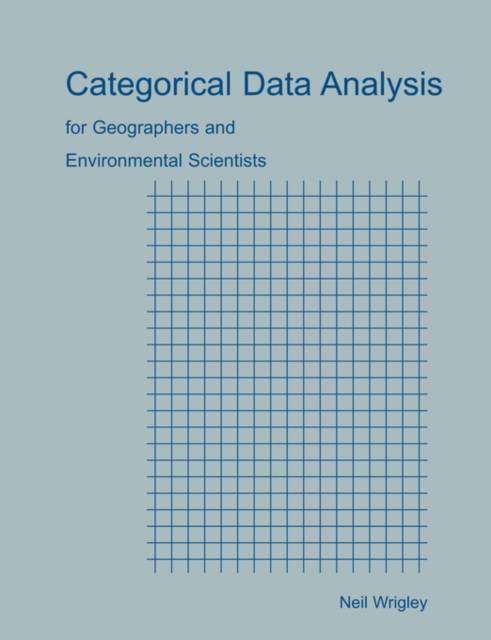
- Retrait gratuit dans votre magasin Club
- 7.000.000 titres dans notre catalogue
- Payer en toute sécurité
- Toujours un magasin près de chez vous
- Retrait gratuit dans votre magasin Club
- 7.000.000 titres dans notre catalogue
- Payer en toute sécurité
- Toujours un magasin près de chez vous
Categorical Data Analysis for Geographers and Environmental Scientists
Neil Wrigley
Livre broché | Anglais
94,95 €
+ 189 points
Description
Categorical Data Analysis for Geographers and Environmental Scientists, originally published in 1985, provided the first account of the new integrated approaches to the analysis of categorical data designed specifically to meet the needs of the geographer and the environmental scientist. It is intended to be the logical sequel to the type of multivariate statistics course that most researchers in those fields will have encountered. As such, it is much more comprehensive in scope than other texts in the field. The book contains more than 40 empiric illustrations (from oil exploration to transport planning in cities), which are designed to form an integrated part of the text. These serve to link the theory to the practice of geographical and environmental science research. Dr. Wrigley's book was a milestone in data analysis in the spatial sciences. It provided an account of a revolution that has swept through an area of statistical methodology and that has transformed the practice of data analysis for social and environmental scientists. The book is sensitive to the likely statistic/mathematic backgrounds of geographers and environmental scientists and is written in a fashion that should be accessible to all higher level undergraduate and postgraduate students, faculty and researchers in those areas. "One of the liveliest areas of statistics during the past 15 years has been the analysis of categorical data, counts or frequencies of different classes. Historically a poor relation of the analysis of continuous data, the field has been unified by the development of related families of models (logit, logistic, log-linear, and so on), which supersede or subsume earlier approaches based on measures of association or chi-square testing, many of them rather isolated or ad hoc. As, among geographers, Neil Wrigley has been the leading advocate and exponent of these new methods, it is especially appropriate that he should produce a guidebook for his colleagues. Thorough, professional and beautifully laid out, his text leads the reader steadily through the new terrain, with many helpful remarks on confusing points like notation . . . . He can be congratulated on a major contribution to the geographical literature." The Times Higher Education Supplement "The book must certainly be regarded as a major contribution to quantitative analysis in geography and environmental science. It will undoubtedly appear daunting to many readers at first, but is worth persevering with and has the merit that it will bear repeated reading as the expertise of the analyst develops." Transactions of the Institute of British Geographers "Wrigley has succeeded in producing a first-rate book which covers many of the major geographically relevant developments of categorical data analysis and presents them in an integrative, stimulating, and comprehensible way. The book should become both a standard text for courses on statistical methodology at the higher-level undergraduate and postgraduate level and a must for the researcher involved in the modelling of spatial choice behaviour and in analyzing categorical data." Geographical Analysis Neil Wrigley Ph.D. (Cambridge), D.Sc. (Bristol) is Professor of Geography at the University of Southampton, UK (where he has been Head of Department 1992-95, 1999-2001). Previously, he was Professor and Head of the Department of City & Regional Planning, University of Wales, Cardiff, and before that Reader in Geography at the University of Bristol. He has held visiting appointments at several universities in the USA, Canada and Australia, an Erskine Fellowship in New Zealand, and was Senior Research Fellow at St Peter's College, Oxford (1996-97). He is currently founding editor of the Journal of Economic Geography (Oxford University Press) and was previously (1988-93) editor of Transactions of the Institute of British Geographers.
Spécifications
Parties prenantes
- Auteur(s) :
- Editeur:
Contenu
- Nombre de pages :
- 412
- Langue:
- Anglais
Caractéristiques
- EAN:
- 9781930665576
- Date de parution :
- 01-06-02
- Format:
- Livre broché
- Format numérique:
- Trade paperback (VS)
- Dimensions :
- 189 mm x 246 mm
- Poids :
- 730 g







